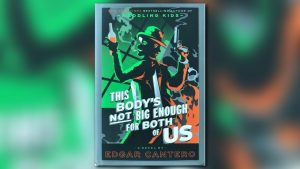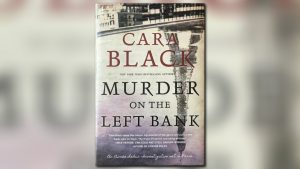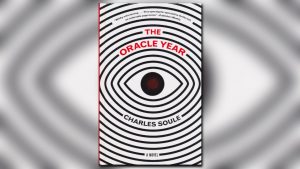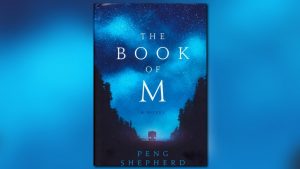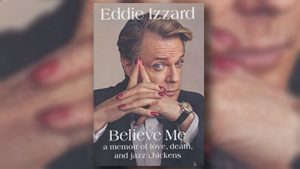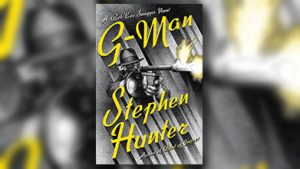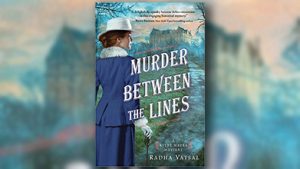“An Unquenchable Thirst: A Memoir” is a personal account of Mary Johnson’s time spent in the Missionaries of Charity.
A devoted member of 20 years, Johnson opens up her life to readers in order to let them see why she eventually decided to leave her sisters.
Each page offers explanations as to how simple tasks could be the most complex and difficult experiences.
Stifled by strict regulations and rules, Johnson recollects upon her affair with a priest and outlines her journey away from her original beliefs and previously held values.
Her memoir offers an inside look on what it was like for her as a nun.
NARRATOR: "Books & Co." is made possible by the Virginia G. piper center for creative writing. Serving writers and readers in the Phoenix metropolitan area, the state of Arizona, and the world.
ALBERTO RIOS: Welcome to "Books & Co." I'm your host, Alberto Rios. We're joined today by Mary Johnson, former missionary of charity, talking about her memoir, "An Unquenchable Thirst." Published by Spiegel & Grau. Welcome, Mary.
MARY JOHNSON: Thank you. It's great to be here.
ALBERTO RIOS: I'm excited. I have so much to ask you. But I want to start with a kind of a general question about writing a memoir. How do you do it? And who gets hurt and who gets helped, and who gets what?
MARY JOHNSON: Yeah. The decision to tell my story was I think very complex for me. Because I knew there was a story to be told. I write about having been a missionary of charity, one of the sisters of Mother Teresa of Calcutta, and everybody thinks they know who Mother Teresa is. What the life of a missionary of charity might be. But when I left the sisters I realized the image didn't always correspond to the reality. I felt a certain obligation I think to show a more come appreciation situation, to go deeper than had been possible until then.
ALBERTO RIOS: She in so many ways is an icon would seem untouchable, so any kind of discussion would have to be upper level good. I think your book brings complexity as any human being brings to the table, brings complexity into the discourse. So I'm excited about that. But the book in many ways is certainly not about her.
MARY JOHNSON: No, it's not.
ALBERTO RIOS: It's about one young woman entering into this life with all the best intentions, and then we get the kind of everyday doings of what that life is like. And we learn a lot. Not all of it good or happy, a lot of it good and happy, and it's the reason why I would assume you stayed in that life. Can you tell a little bit about the god part of it?
MARY JOHNSON: You know, there's this enormous sense of purpose. You feel like you're doing something useful in the world. There's also a sense of community. The women who were there were remarkable people. Just really, really good people. And you do everything day by day together with these women. We slept in common dormitories, we would get up at the same time, we'd go to the chapel, we'd pray together, work together, clean the house together, have breakfast together, just like everything that we did, we did together. And you develop close bonds with these people. Even though we weren't really encouraged to item each other stories or to be really honest in a deep way. And I think that's what my memoir allowed me to do, is to tell the story underneath the story. But there is that sense of real community, of doing something together.
ALBERTO RIOS: It's interesting when you use the word "community," because you in the book define it in quite a different way. It's community by presence. But not necessarily by intimate storytelling, life telling, things like that. In fact you're quite it seems to me, discouraged from speaking to each other about personal things. Was that accurate?
MARY JOHNSON: Yeah. The whole life of a NUN as Mother Teresa understood it, many 91s understand it -- Nuns it in different ways, as Mother Teresa understood it was dying to self so Jesus could live new. So we were discouraged from talking about our families at home, about our personal likes or dislikes, really anything about ourselves. Even if someone came to the convent, we were not supposed to give our names. I'm sister, but I would not say I'm sister -- The superior could introduce herself by name, she had to be identifiable but the rest of us, the whole idea was to immerse yourself in Jesus and in the mission, and to let yourself disappear. Which is not good preparation for writing a memoir.
ALBERTO RIOS:No, no. And to an outsider that can sound equally scary. Right? That sort of loss of self in a way is the stuff of science fiction and cults and different things like that. But I don't think -- That's one of the great things I think the book does. It gives us the life inside. It doesn't gloss over anything. If you come in as an outsider wondering how can this be, or how can somebody do this or suffer this, that's what the book shows us. This is how. Day-to-day. You have a great moment. You were talking about being with all the sisters. You have a great moment about eating and bumping elbows with everybody. It was just a wonderful moment, because it was so metaphoric as well. You had room, but just enough.
MARY JOHNSON: Just enough. And sometimes not quite enough.
ALBERTO RIOS: That's a memoir -- That the memoir makes clear.
MARY JOHNSON: We were always doing things together, and because we lived a poor life there was never any extra space. Especially when I lived in Rome and was working with the formation of sisters when they were preparing to take their vows, there would be large groups of sisters, 25, 30 at a time and we would be on these long benches, and the elbows -- You'd want to be careful where you put your fork.
ALBERTO RIOS: It's a life, and I think we have a word like nun or something which strikes us as something so far away from us that we don't see it as a life. It's a vocation, it's a calling. But the dailiness is different. I grew up in those circumstances as well, and if you ever saw one of the nuns driving a car, you just thought that was like the funniest thing in the world! What? They don't drive cars. But it was funny. You take us certainly deeper than that, and we learn a lot about missionaries of charity. And that daily life included a lot of things including, for example, the discipline which, wow, that just blew me away. Maybe you could talk about what that is.
MARY JOHNSON: Mother Teresa believed very much that suffering was what brought a person close to god. It was one of the reasons that she saw the poor people and people who were dying, people who were ill, homeless, as sharing in the sufferings of Jesus, and therefore something really divine there. Not only just because they were human beings, but that suffering added this element, it was almost a glorification of suffering. And we were meant to share that suffering of the poor. And so one of the things we did was corporal pen answer of various sorts. Sometimes fasting, like during lent, but we'd go further than that. We had these little whips made out of rope we made ourselves with which we would beat ourselves every night, basically. And we had --
ALBERTO RIOS: Wow.
MARY JOHNSON: Little chains made out of wire, they're spiked chains we'd wear around our arms and around our waists when we prayed. And this was as mother saw it, a way of uniting ourselves with the suffering of the poor and Jesus.
ALBERTO RIOS: Pretty visceral. And difficult to take in. Right? To conceive somebody would do that and think it was a good thing. But that's a great explanation. I understand it. And I think that's one of the things you helped me as a reader to do. It made sense in that context on its own terms. Not on my terms.
MARY JOHNSON: Exactly.
ALBERTO RIOS: But on its own terms. I thought it was quite great. We learn a lot of other things. The storytelling stays true to the story. It doesn't ever rush. And you have some in terms of the writing itself, you use all sorts of writerly things, one of my favorites was the juxtapositions that you occasionally present. And you start early on with yourself, but you're the character in the book. I want to talk about that separation in a moment. Sister DONATA, reciting a prayer while hearing kids outside doing a jump rope song. And kind of a dicey jump rope song. Can you talk about that moment? What does that feel like, that juxtaposition which is so stark?
MARY JOHNSON: That happened so often. That particular scene took place in the south Bronx, I joined the sisters in the south Bronx and we just had a house, it's still there, and on east 1 hundred 45th street right next to the projects. The projects were just on the other side of the street. And we would hear all the noises. This was during the late '70s when the south Bronx was really a tough place. And we'd hear gunshots, we'd hear -- And the boom boxes were really huge, kids were break dancing a lot on the streets. This particular day we were in the chapel praying, and the kids were playing jump rope outside and you'd hear these different things, we'd pray and they'd say, you know, doctor, doctor, whatever, and they would go back and forth. I think that life of where we were really immersed in the life of the people we served. And it even when we were praying.
ALBERTO RIOS: The underlying juxtaposition was equally interesting to me. It's unsaid, but you are trying to come close to suffering in order to connect to god, but you're trying to take away the suffering of those around you. Can you explain that?
MARY JOHNSON: I think it's kind of a schizophrenia existence in one sense. The suffering was valued, but our whole life was to take people and comfort them in their sufferings. It wasn't so much to bring them out of their sufferings, but to feed the hungry, to clothe the naked, it didn't make a lot of logical sense. And I did experience that, this lack of logic.
ALBERTO RIOS: Which you talk about a lot. Logic isn't always what guides everything. We'll come to that as well. You have that great juxtaposition when Princess Diana comes to visit and you talk about their shoes.
MARY JOHNSON: This was in Rome, Mother Teresa and Princess Diana met for the first time at the house that I lived in. And they went into the chapel to pray, and mother asked that it would just be them and the rest of us were waiting outside. And she took Princess Diana in and we always had the ha 50 leaving our shoes outside the chapel door. And mother and Dianna were kneeling together and their shoes were outside. And Mother Teresa's sandals had been mended so many times, I wasn't even sure there was any of that original leather left. We would mend them ourselves. And next to that was Diana's pumps. She had these beautiful black shoes that perhaps she's never worn before. And it was remarkable picture that always stayed with me.
ALBERTO RIOS: You have that wonderful kind of final assessment of the moment. Here they were in the end, just two women kneeling before god that. Was a beautiful -- For all the differences. You found the commonality. And I think that's the best part of what the book has to offer, is for all the disagreements we might have about so many things, there are some common moments that draw people together. I think that's quite exciting. I want to also talk about the specialized language, starting with names. You don't go in as sister Mary Johnson. And you took a very specific name. And it defined you in some way. Can you talk about that choosing that name, or was even choosing the name not something you were supposed to think about? How did you come to it?
MARY JOHNSON: We were allowed to choose our own name. Sometimes some sisters were and some weren't, but our particular group we chose our own. I had a hard time. I was thinking I could take a version of my father's name, but my father's name was john, and every version of john was taken already. And my mother's name was Claire, and that was my middle name, so I already had it and I had to change my name. So I couldn't do that. And I just wondered for a long time. And then there was a sister in my group who was Italian, and she told us she had gotten a letter from a friend whose name was Donata. And this woman had multiple sclerosis, but she had this great face and she was talking to us and I was thinking, Donata. What does Donata mean? And she said it means freely given, like donation. I said, that's the name I want. I want to be the freely given one. And it sounded nice, exotic. I liked it.
ALBERTO RIOS: That's a great story. I'd like to tick a moment -- Take a moment to remind our guests you're watching "Books & Co." I'm your host, Alberto Rios and we're join bide Mary Johnson, talking about her memoir, "An Unquenchable Thirst." We're talking about language and names. You've got the title of the book, your own title, "sister Donata, freely given" but you've got this title to the book that haunted me all the way through. "An Unquenchable Thirst." In the beginning, it was so clearly for Jesus, or for guidance for something along those lines. But it changed. I think, as we go through the book. Do you want to talk about that a little? Or do you think -- Maybe it didn't.
MARY JOHNSON: I do think it changed. "An Unquenchable Thirst" operates on a lot of levels. Because for the missionaries of charity, the idea of thirst is really important. In the chapel, there's always a crucifix next to that near the face of Jesus are the words "I thirst." And every time we went to pray, we would see those words that Jesus spoke on the cross. And this idea that there is something more, and that even Jesus thirsted for more. You take that metaphorically, not just as a thirst for water. And for me, yes, in the beginning the thirst for god, this thirst for meaning, and eventually a thirst for being human. And for being myself. There was this huge ever change, and this realization for me that being god -- This thirst for god in some sort of abstract way or living it out day by day, couldn't be separated from my thirst for being human. And for being myself. And it was hard to be myself as a sister. And ultimately that was one of the things that led me to leave.
ALBERTO RIOS: In the far edge of that, too, is thirst for more suffering. That's a little edgy, but --
MARY JOHNSON: A little edgy, yes.
ALBERTO RIOS: You have some -- What's wonderful is to watch you as a character learning some vocabulary. You were already smart going in and we have that in front of us, but these wonderful moments where you talk, for example, about immaculate heart, or religious being a noun rather than an adjective. Immaculate. You were --
MARY JOHNSON: There’s a lot of jargon. And I tried to make it easy for readers. I didn't -- I tried to introduce words in a painless way. But with any particular group, there's always the jargon of the group. Whether you're computer geeks or whatever. And the language is always interesting. To refer to Mary as the immaculate heart instead of Mary or the mother of Jesus, but she is the immaculate heart. It's a whole different feel for, OK, what sort of attitude do I have towards this person? And who is she? Language is always important, and to find the right language to use in the book as a whole, I wanted to write with simple words, so people could get very close to my experience, and that the language would kind of disappear, was one of my goals.
ALBERTO RIOS: And that particular phrase by the way, puts the emphasis on heart. Not on virgin birth and all of the other things that get so confusing about that. But that's a nice sort of thing. And religious, living the life -- There's different phrasings of it, but --
MARY JOHNSON: In the Catholic Church, religious can often become a noun. Anyone who takes the religious vows of poverty, chastity, and obedience becomes a religious.
ALBERTO RIOS: A religious.
MARY JOHNSON: Yes.
ALBERTO RIOS: Which sounds so odd to us, but it makes sense. And then there's this wonderful word at the end, and it's heroic, tragic, all of the things mixed together -- Exclaustration.
MARY JOHNSON: Coming out of the cloister. When I left I didn't immediately leave my vows. You have a year in which you kind of reconsider things. Not Liking with the community but trying to decide.
ALBERTO RIOS: What is interesting about that word, exclaustration, you don't just get to leave, apparently. You get permission as you get so many permissions, even to leave.
MARY JOHNSON: I had to write a letter to Mother Teresa when I wanted to leave. I wrote that letter in January.
ALBERTO RIOS: It scares me even now hearing it. I can't imagine going through it at all.
MARY JOHNSON: I wrote the letter in January, didn't get a response until mid-March. And the response I got in mid-March said, well, yes, you can leave if you really need to, but not until the end of May. So I had to wait longer still. And then everything requires permission. When I did leave and made the decision that not only was it going to have to share the -- Ask for exclaustration, but I had to ask to be resolved from my vows, hi to write to the pope. I got a response back from the cardinals who was in charge of those things.
ALBERTO RIOS: And in doing that, in that exclaustration, you go through a period of reflection. What is which you had already been going through. As yourself, going through this. It's hard to know where all of this -- It's not where it comes from, but how you can hold it all together. And eventually you can't. The outlets, everything starts to get squeezed so tightly, things start squirting out, and it had to be a feeling that I'm not sure has a name. Maybe you can talk about what that --
MARY JOHNSON: I called it suffocation, I think. It was kind of like, I really -- I couldn't breathe anymore. I didn't -- Just this -- Where am I going to get the strength to go on. There isn't even any oxygen in the room anymore. And that was my experience.
ALBERTO RIOS: It's so underscored by that great line of Mother Teresa where she was saying, sisters in Beirut found themselves under fire, and they called Mother Teresa and say, can you help us, and she said --
MARY JOHNSON: She said, are you dead yet? Call me back when you're dead. We're there to continue on.
ALBERTO RIOS: That is quite a statement. And it underscores everything you're saying. That's the attitude that was the foundations of everything were you doing. Are you dead yet? Call me when you're dead. I laughed when I read that, but I understood the gravity of it at the same time. There's also -- These are human beings, all together, so there are issues of sexuality, all the way through. You don't -- You renounce something, but you don't renounce being a human being. And maybe you can talk about that mix that complexity, which I think is incredibly touching in the book.
MARY JOHNSON: It was one of the reasons I really wanted to write this story. When I was deciding whether I was going to write the book, was at the time the revelations of the depths of the problems with pedophilia in the Catholic Church were coming to the floor. And I heard people talking about legal issues, and historical issues, and -- But nobody was talking about what does it really feel like to try your best to live a life of celibacy? Our human being. A human being by nature is a sexual being. And the struggles that you have are the desires that you have, the frustrations, nobody was addressing that. And I felt like we needed to be honest about our own experiences, even though it can be hard to talk about it. But I wanted to do that. And I wrote all the embarrassing parts there. I had a relationship with a sister, I fell in love with a priest, and that -- I discovered that I needed more close intimate relationships than my vows allowed.
ALBERTO RIOS: It's interesting you would use the word embarrassing. When I read this, it wasn't about embarrassment in any way, shape, or form. It was at the core of something that as you say, wasn't being addressed. And the smallest moment, the brush of a hand on a shoulder, those things which you render so well, you don't get on any kind of soapbox whatsoever. You simply speak to the moment, you stay true to it, and I think that affects us as readers. So thank you for doing that part of it. I know that had to be difficult regardless. So many names are mentioned here. Are they changed? Are they the people? I probably should ask you that. You talk about being so close to so many sisters and so wonderful people, but not all of them were wonderful.
MARY JOHNSON: True enough. In any group you're going to find the good and the bad, and the not so god. I decided to keep the names of anyone who had held elected or appointed office. Superiors are basically public people. And then I changed the names of anyone who wasn't. The normalcies terse, I changed some identifying features, maybe the way they looked or the country they came from. Because they have their private lives. But I did want to keep the names of people who held office, also because I think you have a certain responsibility when you have office.
ALBERTO RIOS: I think that seems decent. Some people don't do that, and all sorts of fire happen. I'm not sure that serves us. But that's an interesting thing for you to deal with. What happens now? You've written this book. Has there been fallout, or applause, or how would you characterize that?
MARY JOHNSON: People react in all sorts of ways. One of the best responses I had was indirectly from the sisters. The sister who is now superior general who took Mother Teresa's place --
ALBERTO RIOS: Can she can named?
MARY JOHNSON: Someone who I have known for a long time. And she was interviewed by a journalist who asked her about my book. And she said, "Well, this is a time when we need to look at the time of introspection, and Jesus is asking us if we need to change anything." And I thought it was so wonderful, the response.
ALBERTO RIOS: That's a wonderful question to ask all of -- For all of us. Mary, I am so pleased to be able to talk with you about this book. I think I got a lot out of it personally, and I appreciate that you took the time to go through each of those pages and write them out. Because that had to be exhausting.
MARY JOHNSON: Thank you. Thank you.
ALBERTO RIOS: I'd like to thank our viewers for joining us. You've been watching "Books & Co.," I'm your host Alberto Rios. We've been joined today by Mary Johnson, talking about her memoir, "An Unquenchable Thirst." Please join us again next time when we will bring you another good book.








